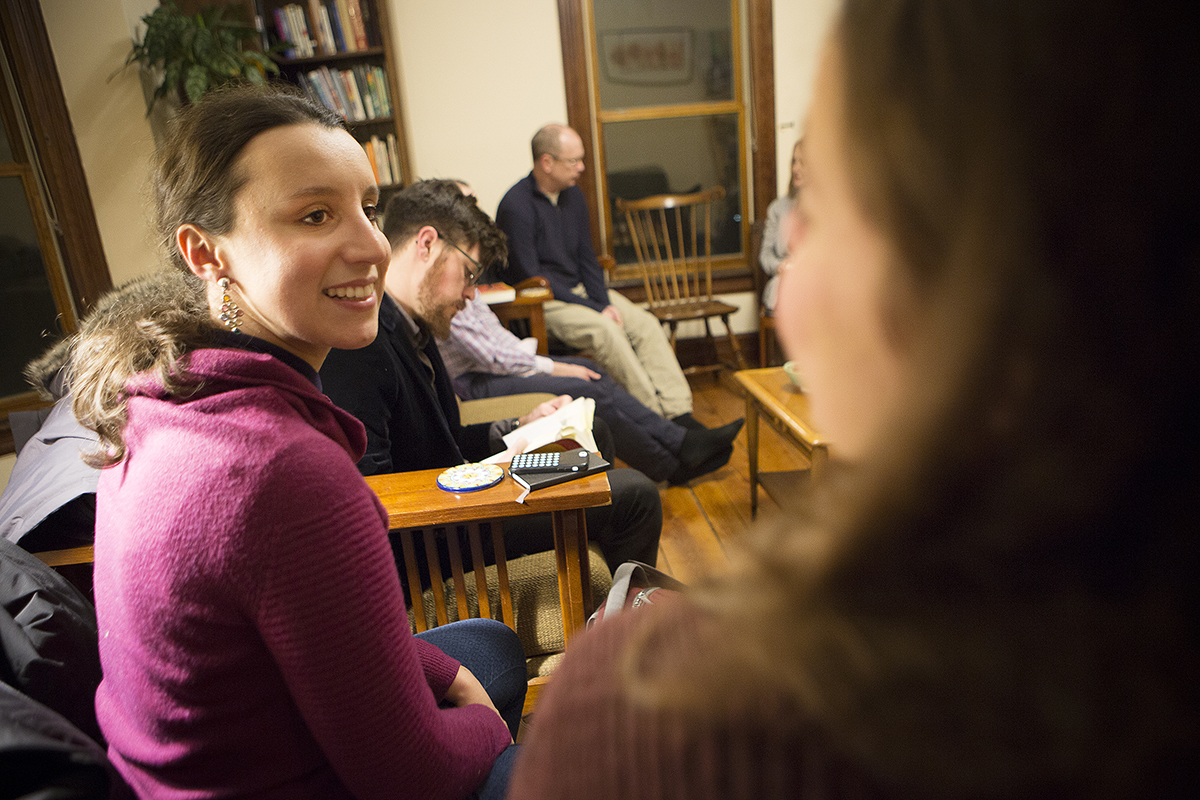Grad students find support in creative writing group
By Linda B. Glaser

“My name’s Ishmael, what’s yours?” – or would “Call me Ishmael” better open a narrative about whaling? Tone, diction, style: these are the kinds of questions Cornell’s Historians Are Writers! (HAW) grapple with in their meetings. Since there’s no one right answer to such questions, experimentation, exploration and creativity serve as the group’s guideposts.
HAW members gather about every three weeks in someone’s home in an informal, friendly atmosphere, says group coordinator Joe Giacomelli, a graduate student in the field of history. At the meetings participants discuss books they have read, which vary widely and include history, memoir, fiction, creative nonfiction and graphic novels.
For the 2017 spring semester, HAW will read a characteristically eclectic series of works: “The Sympathizer” by Viet Thanh Nguyen, Shakespeare’s “Henry IV” and “The Empire of Necessity” by Greg Grandin. The book discussions are free-ranging, Giacomelli says, but are always brought back to what can be learned about writing. Sometimes visiting scholars are invited to discuss their works in progress.
Founded in 2007, HAW is based in the history department and mostly consists of graduate students, although anyone is welcome to join and members represent a wide variety of fields, including anthropology, science and technology studies and English. They share a belief that producing good books depends on good writing as well as making a convincing argument.
Laura Martin, M.S. ’10, Ph.D. ’15, who was finishing her master’s in natural resources when she got involved, says being a member of the group changed the type of scholarship she pursues. “I’ve come to see decisions about style and audience as equally as important as argumentation and sources; I view the writing process as inseparable from the research,” she says. “What we take away from a work of history is not just the new facts uncovered by the historian, but also the argumentation made through the narrative or analytic writing.”
HAW members say the group creates a space where enthusiasm for regular work gets renewed and refreshed. And because the usual competition with classmates is stripped away – everyone is reading new kinds of writing in which they have no expertise – HAW creates “an incredibly supportive, humane space,” says Aaron Sachs, professor of history and the group’s faculty mentor.
Founding member Heather Furnas, Ph.D. ’14, agrees, describing HAW as “a caring community, a very tight-knit group … a home. I don’t know if I’d have gotten through grad school without it.”
Once a semester HAW holds a writing workshop, for which members submit a short piece of writing – a poem, a grant application, a dissertation excerpt or perhaps a seminar paper – for constructive feedback.
Daegan Miller, M.A. ’09, Ph.D. ’13, who is credited with sending out the rallying call that launched the group, says HAW members were the most supportive and generous critics he’s ever had: “People would tear my work to shreds in ways that were extremely helpful, meeting my manuscript on its own terms, then helping that manuscript fulfill those terms. It gave me a sense of freedom and exploration to chase writing in this way.”
At the end of the year, the group hosts a “History Slam,” showcasing short pieces and works in progress. After the first few readings, the format is open mic, giving participants the chance to try out new approaches and ideas. This year’s event will be held as part of HAW’s first conference on creative academic writing, May 13.
The slam is revealing because it allows authors to hear their work read aloud, Giacomelli says. “It forces you to focus at the sentence level on rhythm, the use of suspense. And it’s really fun.”
Linda B. Glaser is a staff writer for the College of Arts and Sciences.
Media Contact
Get Cornell news delivered right to your inbox.
Subscribe